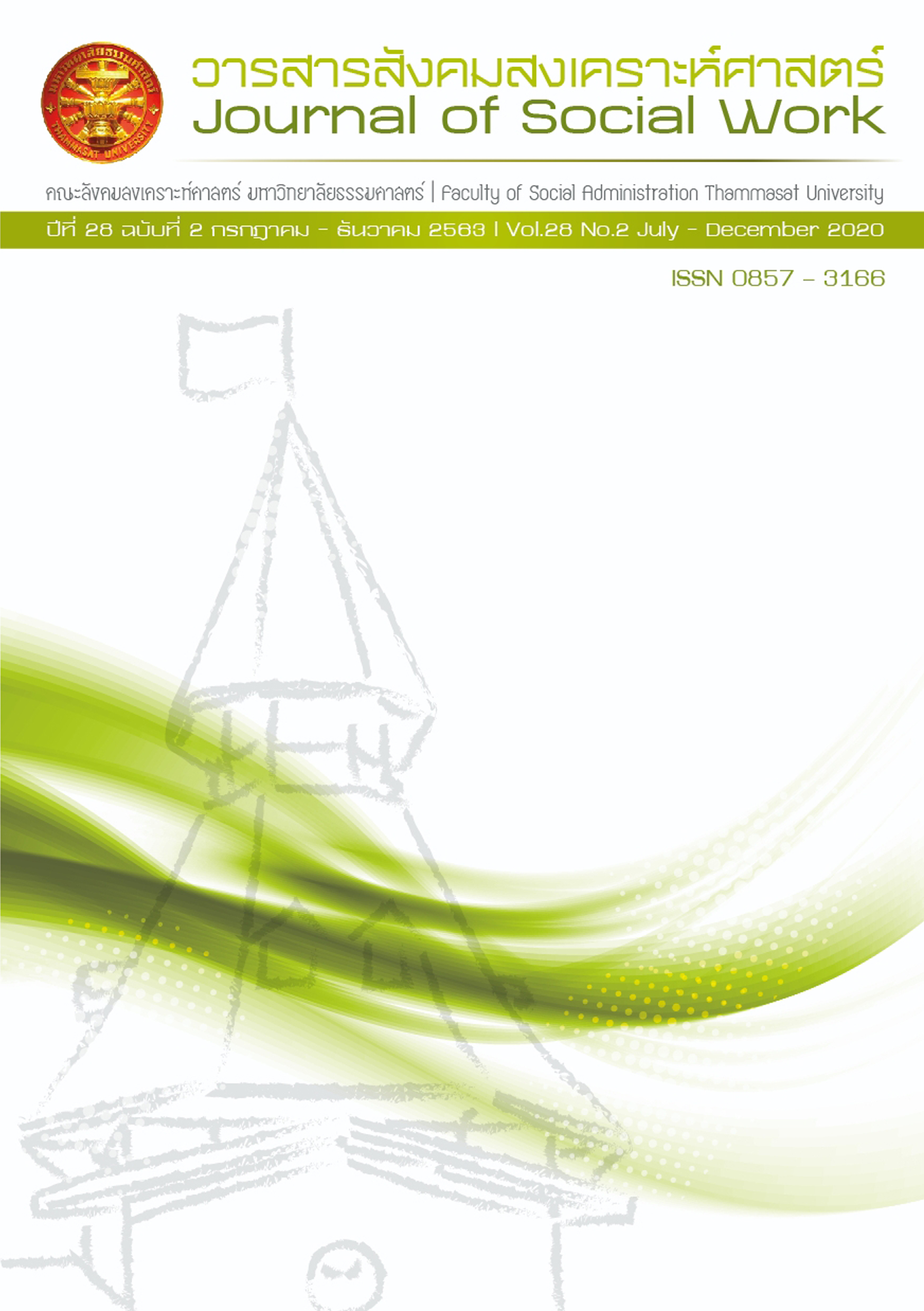Emotional Intelligence and Organizational Commitment with Job Satisfaction as a mediating variable: A case Study of Nurses at a University Hospital
Keywords:
Emotional intelligence, job satisfaction, organizational commitmentAbstract
This research studies emotional intelligence-, and organizational commitment of nurses at a university hospital with job satisfaction as a mediating variable. The sample consists of 360 nurses at a university hospital. The results of the study are as follows: Analysis of job satisfaction as mediating variable; Job satisfaction is a complete mediating variable between overall emotional intelligence and organizational commitment (Z=4.372, p<.01). It shows a partial mediating variable between emotional intelligence and self-motivation (Z=, 3.816 p<.01). Job satisfaction is not a mediator of self-awareness, self-regulation, empathy and social skills.
References
กระทรวงสาธารณสุข, กรมสุขภาพจิต. (2543). คู่มือความฉลาดทางอารมณ์. กรุงเทพฯ: โรงพิมพ์ชุมนุมสหกรณ์การเกษตรแห่งประเทศไทยจำกัด.
ชูชัย สมิทธิไกร. (2554). จิตวิทยาอุตสาหกรรมและองค์การ. (พิมพ์ครั้งที่ 1). กรุงเทพฯ: สำนักพิมพ์แห่งจุฬาลงกรณ์มหาวิทยาลัย.
ณัฐวรรณ แก้วมณี. (2556). คุณภาพชีวิตการทำงาน ความพึงพอใจในงานและความผูกพันต่อองค์การของพนักงานประจำในศูนย์แห่งหนึ่งขององค์กรการบินในประเทศไทย. (งานวิจัยส่วนบุคคลปริญญามหาบัณฑิต).มหาวิทยาลัยธรรมศาสตร์, คณะศิลปศาสตร์, สาขาจิตวิทยาอุตสาหกรรมและองค์การ.
นภาดา อุดมชัยรัตน์ และสมรักษ์ สันติเบญจกุล. (2557). ความสัมพันธ์ระหว่างความฉลาดทางอารมณ์กับความผูกพันต่อองค์การของพนักงานราชการ. แพทยสารทหารอากาศ, 60(1), 47-51.
พิมพรรณ วิไลรัตน์. (2556). ความสัมพันธ์ระหว่างทุนทางจิตวิทยา ความผาสุกทางใจ กับความผูกพันต่อองค์การและความผูกพันในงานของบุคลากรในบริษัทประกันวินาศภัยแห่งหนึ่ง. (งานวิจัยส่วนบุคคลปริญญามหาบัณฑิต).มหาวิทยาลัยธรรมศาสตร์, คณะศิลปศาสตร์, สาขาจิตวิทยาอุตสาหกรรมและองค์การ.
เพ็ญนภา หิรัญรัตนพงศ์. (2550). ความสัมพันธ์ระหว่างเชาวน์อารมณ์ และบุคลิกภาพแบบเชื่อในปัจจัยควบคุมกับความพึงพอใจในงาน: กรณีศึกษาบริษัทเบทาโกร อโกรกรุ๊ป จำกัด (มหาชน). (งานวิจัยส่วนบุคคลปริญญามหาบัณฑิต). มหาวิทยาลัยธรรมศาสตร์, คณะศิลปศาสตร์, สาขาจิตวิทยาอุตสาหกรรมและองค์การ.
วรรณพร สธนเสาวภาค. (2551). ความสัมพันธ์ระหว่างเชาวน์อารมณ์ ความสามารถในการฟันฝ่าอุปสรรคและความพึงพอใจในการทำงาน: กรณีศึกษาบริษัทประกันภัยแห่งหนึ่ง. (งานวิจัยส่วนบุคคลปริญญามหาบัณฑิต). มหาวิทยาลัยธรรมศาสตร์, คณะศิลปศาสตร์, สาขาจิตวิทยาอุตสาหกรรมและองค์การ.
สุภาพร ริยาพันธ์. (2550). ความสัมพันธ์ระหว่างคุณภาพชีวิตในการทำงาน เชาวน์อารมณ์และความพึงพอใจในงาน: กรณีศึกษาพนักงานโรงงานผลิตชิ้นส่วนประกอบรถยนต์แห่งหนึ่ง. (งานวิจัยส่วนบุคคลปริญญามหาบัณฑิต).มหาวิทยาลัยธรรมศาสตร์, คณะศิลปศาสตร์, สาขาจิตวิทยาอุตสาหกรรมและองค์การ.
สุมาลี อยู่ผ่อง และบุญทิพย์ สิริธรังศรี. (2560). การจัดประชุมเสนอผลงานวิจัยระดับบัณฑิตศึกษามหาวิทยาลัยสุโขทัยธรรมาธิราช ครั้งที่ 4 เรื่องปัจจัยการคงอยู่ในงานของพยาบาลวิชาชีพงานการพยาบาลศัลยศาสตร์ของโรงพยาบาลมหาวิทยาลัยแห่งหนึ่งในกรุงเทพมหานคร. สืบค้นจาก http://www.stou.ac.th/thai/grad_stdy/Masters/research/4nd/FullPaper.pdf
อคัมย์สิริ ลียาชัย. (2555). บุคลิกห้าองค์ประกอบ ความฉลาดทางอารมณ์และพฤติกรรมการเป็นสมาชิกที่ดีขององค์การ: กรณีศึกษาพนักงานบริษัทคอมพิวเตอร์แห่งหนึ่งในกรุงเทพมหานคร. (งานวิจัยส่วนบุคคลปริญญามหาบัณฑิต). มหาวิทยาลัยธรรมศาสตร์, คณะศิลปศาสตร์, สาขาจิตวิทยาอุตสาหกรรมและองค์การ.
อัญชลี ยะโหนด. (2555). ความสัมพันธ์ระหว่างเชาว์อารมณ์ ความเชื่อมั่นว่าตนสามารถทำได้ และความพึงพอใจในงาน: กรณีศึกษาบุคลากรสายสนับสนุน มหาวิทยาลัยของรัฐแห่งหนึ่ง. (งานวิจัยส่วนบุคคลปริญญามหาบัณฑิต).มหาวิทยาลัยธรรมศาสตร์, คณะศิลปศาสตร์, สาขาจิตวิทยาอุตสาหกรรมและองค์การ.
อำพรพันธุ์ กังวาลวัฒนศิริ. (2554). ปัจจัยที่มีผลต่อความผูกพันของพนักงานต่อองค์การ กรณีศึกษาพนักงานการไฟฟ้าฝ่ายผลิตแห่งประเทศไทยฝ่ายปฏิบัติการภาคเหนือ จังหวัดพิษณุโลก. สืบค้นจากhttp://www.bec.nu.ac.th/bec-web/graduate/Article/MBA-54/53%20อำพรพันธุ์%20%20กังวาลวัฒนศิริ.pdf
Adeoye, H., & Torubelli, V. (2011). Emotional Intelligence and Human Relationship Management as predictors of organizational commitment. Ife PsychologIa, 19(2), 212-226.
Alavi, S. Z., Mojtahedzadeh, H., Amin, F., & Savoji, A. P. (2013). Relationship between emotional intelligence and organizational commitment in Iran’s Ramin thermal power plant. Procedia- Social and Behavioral Sciences, 84, 815-819.
Allen, N. J., & Meyer, J. D. (1990). The measurement and Antecedents of Affective Commitment, Continuance Commitment and Normative Commitment to the organization. Journal of occupational Psychology, 63, 1-18.
Anari, N. N. (2012). Teacher: Emotional Intelligence, Job Satisfaction, and Organizational Commitment. Journal of Workplace Learning, 24(4), 256-269.
Cekmecelioglu, H. G., Gunsel, A., & Ulutas, T. (2012). Effect of Emotional Intelligence On Job Satisfaction: An empirical study on call center employees. Procedia- Social and Behavioral Sciences, 58, 363-369.
Chovwen, C. (2012). Predictors of Organizational Commitment in factory employees. Ife Psychologia, 20(2), 184-191.
Goleman, D. (1998). Working with Emotional Intelligence. London: Bloomsbury Publishing Plc.
Guleryuz. G., Guney. S., Aydin. E. M., & Asan, O. (2008). The mediating effect of Job Satisfaction between emotional intelligence and Organizational Commitment of nurses: A questionnaire survey. International Journal of Nursing Sciences, 45, 1625-1635.
Leite, N. R. P., de Aguiar, Rodrigue, A. C., de Albuquerque, L. G. (2014). Organizational Commitment and Job satisfaction: What are the Potential Relationships? Bazilliran Administration Review, 11(4), 476-495.
Luthans, F. (2008). Organizational Behavior. Singapore: Mc Graw Hill.
Masrek, M. N., Osman, M. A. F., Ibrahim, Z., & Mansor, A. N. (2015). Malaysian Computor Professional: Assessmant of Emotional Intelligance and Organizational Commitment. Procedia Social and Behavioral Sciences, 172, 238-245.
Nikolaou, I. & Tsaousis, I. (2002). Emotional Intelligence in the Workplace: Exploring its Effects on Occupational Stress and Organizational Commitment. International Journal of Organizational Analysis, 10(4), 327-342
Nordin, N. (2012). Assesing Emotional Intelligence, Leadership Behavior and Organizational Commitment in a Higher Learning Institution. Procedia-Social and Behavioral Sciences, 56, 643-651.
Onuoha, U. C., & Segun-Martins, I. O. (2013). Predicting Job Satisfaction of Married Female Employees: The Role of Age and Emotional Intelligence. Gender and Behavior, 11(2), 5745-5751.
Shafiq, M., & Rana, A. R. (2016). Relationship of Emotional Intelligence to Organizational Commitment of College Teachers in Pakistan. Eurasian Journal of Educational Research, 62, 1-14.
Shooshtarian. Z., Ameli. F., & Aminilari. M. (2013). The Effect of Labor Emotional Intelligence on Their Job Satisfaction, Job Performance and Commitment. Iranian Journal of Management Studies (IJMS), 6(1), 29-45.
Taboli, H. (2013). Job Satisfaction as a Mediator in Relationship between Emotional Intelligence, Organizational Commitment in Employees’ Kerman Universities. Life Science Journal, 10(1), 1-8
Yang, J., Liu, Y., Chen, Y., & Pan, X. (2014). The effect of structural empowerment and organizational commitment on Chiness nurse’ job satisfaction. Applied Nursing Research, 27, 186-191.
Published
How to Cite
Issue
Section
License
The manuscripts published in the Social Work Journal is the copyright of the Social Work Journal, Thammasat University
Any article or opinion appeared in the Social Work Journal will solely be under the responsibility of the author The Faculty of Social Administration, Thammasat University and the editors do not need to reach in agreement or hold any responsibility.



